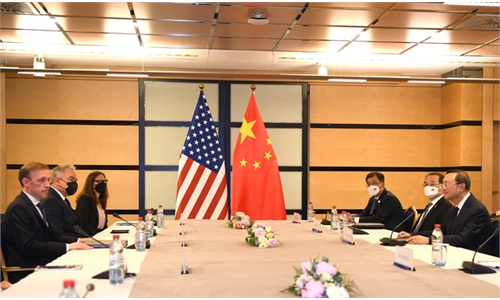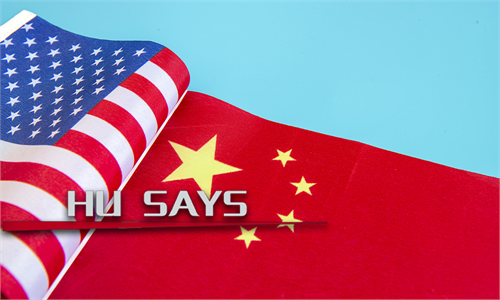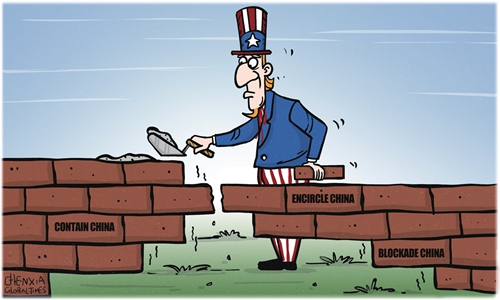Manage strategic competition to maintain peace and stability of China-US relations: Kevin Rudd

Kevin Rudd Photo: asiasociety.org
At the recent BRICS Summit, Chinese President Xi Jinping posed an important question: "Where is the world headed: Peace or war? Progress or regression? Openness or isolation? Cooperation or confrontation?" This is indeed a deeply relevant question for our times, because we live in an increasingly dangerous decade. The possibility of crisis, confrontation and war is no longer unimaginable.Which is why the theme of this forum - peace - is now deeply relevant to security in Europe in the face of Russia's invasion of Ukraine, the future of US- China relations, and the future of the wider international community.
This is therefore time to carefully think through, and calmly reassess, the dangers presented by potential conflicts that could be sparked by today's ever-expanding geopolitical tensions.
Unfortunately, the largest of these risks today is the possibility of confrontation, conflict, and even war between China and the United States.
Even five years ago, this prospect was regarded as absurd, because of the depth and breadth of the strategic, diplomatic, economic engagement between Washington and Beijing, both regionally and globally.
But today we must frankly acknowledge it is no longer unthinkable.
Bit by bit, the political and diplomatic insulation around the relationship has been stripped away. It's now a bit like walking into a workshop with exposed wires and cables lying everywhere, water on the floor, and sparks flying everywhere.
Conflict - even if it were to begin on a limited scale - between these, the world's two most powerful nations, both militarily and economically, would soon escalate and become catastrophic for both - and indeed for the whole world.
However, crisis, conflict, and war are by no means inevitable. Indeed, that is why I have entitled my most recent book "The Avoidable War." I don't believe either side has any desire for conflict.
As US Secretary of State Antony Blinken said in a recent speech at the Asia Society: "There's no reason why our great nations cannot coexist peacefully, and share in and contribute to human progress together."
And yet, for the decade ahead there remains a real, and growing, risk of unintentional crisis, conflict, escalation, and war. How can this be the case? Fundamentally, because both countries are locked into a new form of strategic competition for regional, and eventually global, primacy.
China seeks to realize its national ambition of the great rejuvenation of the Chinese nation.
And the United States intends to remain as the most powerful nation on earth and as the continuing fulcrum of the international order that it constructed out of the ashes of the Second World War.
At one level, history tells us competition between nations is in itself natural. On some occasions, it has ended in violence. On others, competition has been conducted peacefully.
Within the ideological framework of Marxism-Leninism, there is nothing determinist in dialectical theory that the struggle between opposites must be resolved by violent means.
Even Mao's theory of contradiction embraces two forms of struggle: violent and non-violent. Indeed, the actual form of competitive struggle to be embraced, within the wider analytical framework of comprehensive national power, and the changing nature of the balance of international forces, remains a conscious political choice.
It is similar within Western international relations and strategic theory. Even the deeply realist worldviews of Hans Morgenthau, Kenneth Waltz, John Mearsheimer - including their preoccupation with the security dilemma of all states, the strategic choices associated with the balance of power, and the particular logic of rising powers and established powers - do not imply that war is inevitable.
As I see it, the core strategic problem we face today is that the form of strategic competition that is currently unfolding between China and the United States is what I describe as "un-managed strategic competition." There are no rules. There are no guardrails. And there is a lot of push and shove - or what dialecticians might describe as action and reaction, with one side seeking through its own efforts to establish a more favorable equilibrium than before.
This type of superpower competition also runs the risk of degenerating into blows - unless mutually agreed restraints are developed and agreed and adhered to.
The reality is that simply muddling through, in the hope that incidents and escalation can magically be avoided, is wholly insufficient to manage the risks associated with confrontation, conflict, and even war.
To avoid sleepwalking into war, as our world has done too many times in the past, there is a deep interest on the part of all countries that both the US and China construct a joint strategic framework to help maintain the peace - or at least to reduce the risk of war by accident. And that they do so quickly.
In my book, The Avoidable War, I have proposed one such joint strategic framework, which I call "Managed Strategic Competition."
The idea is relatively straightforward, although it's execution is not.
First, the United States and China must have a clear, granular understanding of each other's irreducible strategic redlines in order to help prevent conflict through miscalculation.
Each side must conclude that enhancing strategic predictability advantages both countries, that strategic deception is futile, and that strategic surprise is just plain dangerous.
This will require a focused, detailed, high-level diplomatic understanding on irreducible national interests in critical domains such as Taiwan, the South China Sea, the East China Sea, the Korean Peninsula, and cyber and space.
And it will include building guardrails into the relationship that can reduce the risk of overreach, miscommunication, and misunderstanding.
This process will not be easy. It will require hard, direct conversations and firm resolve. But it is necessary.
The central question here is whether strategic stability is best assisted by a process of push and shove as each side seeks to find how far they can go without generating a large-scale reaction. That's unmanaged strategic competition - and I argue that it is now just too dangerous.
Or if the alternative is better. Which is to clarify redlines internally, communicate them diplomatically so that each side knows that, if these are violated, there will be consequences. This does not rest on the premise of any level of strategic trust, although trust may be rebuilt over time, based on patterns of consistent security behavior.
That's what I call managed strategic competition. And I argued that on balance, it is more stabilizing than the unmanaged alternative, which ultimately rests on the assumption that equilibrium is best achieved through rolling, uncontrolled operational experiment.
Second, both countries could then embrace non-lethal strategic competition across much of the rest of their overall relationship. They could channel their strategic rivalry into a competitive race to enhance their economic and technological strength, their foreign policy footprint, and even their military capabilities.
This would also involve competition of ideas and ideologies for the future of the international system, including the American concept of a liberal- democratic global order and China's emerging concept of a "community with a shared future for mankind."
But, crucially, this would be managed competition because it would be non- lethal in nature.
Properly constrained, such competition can also reduce the risk of armed conflict, rather than tempting either side to risk everything by prosecuting a dangerous war with unpredictable results out of a sense of systemic necessity.
Such strategic competition would also enable both sides to maximize their political, economic, and ideological appeal to the rest of the world.
Both would understand and accept that the most competitive national system would ultimately prevail by becoming (or remaining) the world's foremost superpower and eventually shaping the world in its image through the power of its example.
And as I have argued elsewhere: may the best system win - both in their respective races to enhance their comprehensive national power, and in the wider court of international opinion as all nations contemplate their futures under a US-led or China-led international order.
Third, this framework of managed strategic competition could also create the political and diplomatic space necessary for the two countries to continue to engage in strategic cooperation in those areas where their national interests align, including on pressing global challenges.
Neither China nor the United States, nor the world, can afford for such cooperation on such challenges to fall by the wayside.
Both sides understand this. As President Xi said, now is a time to "tide over difficulties together" in order to pursue cooperation for the global community.
Or as Secretary Blinken put it: "We can't let the disagreements that divide us stop us from moving forward on the priorities that demand that we work together, for the good of our people and for the good of the world."
There are many areas where such cooperation could be pursued. One of them is climate change, a challenge both countries have identified as urgent and impossible to solve without the other. Which is why both have been admirably able to work constructively together on this issue to take meaningful action in the past, including issuing the groundbreaking Glasgow Joint Declaration last year at COP26. Such dialogue and cooperation can and should continue, no matter the two nations' disagreements.
Other potential areas of cooperation abound, including global public health and preventing the next pandemic, global food security, and arms control and non-proliferation - including on the Korean Peninsula, where strategic stability is in both nations' strong interest.
And, perhaps most pressingly in the short term, we appear to be entering a period of significant global economic and financial stress, especially for the most vulnerable developing nations. Potentially cascading financial, economic, supply chain, and humanitarian risks are multiplying.
President Xi recently stated that now is the time to "come together with a united purpose and strengthen macroeconomic policy coordination" in order to avoid a worsening crisis.
This should not be an area in which it is impossible for the US and China to make progress and work together to support the world economy - even if only for their own economic benefit. After all, this is what we all managed to do together during the global financial crisis.
Importantly, no serious cooperation in any of these areas is likely to go very far unless the US-China relationship can be stabilized by the first two elements of managed strategic competition I've outlined here: strategic guardrails and rules of the road that allow strategic rivalry to be channeled into natural, non- lethal forms of strategic competition. Because, without these steps, the space for cooperation is likely to continue to shrink.
Finally, for this compartmentalization of the relationship to have any prospect for success, it would need to be carefully and continuously managed by a dedicated matching of cabinet-level senior officials on both sides.
Moreover, this framework would then need to be maintained with a steady hand, no matter what other domestic political or international turmoil might arise.
I have no doubt that this approach will face criticism in both Washington and Beijing for not being sufficiently sensitive to each side's national interests.
Hardheads on both sides will likely have the same complaint: that it does not inherently skew the rules of the game so as to ensure the other side will lose, allowing them the opportunity to either grow or prevail as a global superpower.
And indeed, this is true. In fact, it is precisely the point! For any strategic framework to manage the relationship to succeed, it needs to be one that both sides can be willing to sign on to, knowing that it can allow them not only to survive, but to flourish. Only then can their competitive spirit remain within non-lethal bounds.
Both must have a fair chance to compete and prove that theirs' is the more competitive system - at least for their own people, as well as in the eyes of the world at large.
I know some in Washington will still complain of "appeasement." This is false: this framework is based simply on the bedrock of pragmatic, realistic deterrence that can be clear to both sides.
Meanwhile I know that some of my friends here in Beijing will argue that it does not account for America's use of its influence to form alliances and networks of friends. That is true - this is one of America's strengths. But this does not prevent China from using its own influence to itself win friends around the world, especially if it can continue to grow and thrive as an attractive business partner, magnanimous friend, and reliable strategic ally.
Ultimately, my challenge to critics of Managed Strategic Competition on both sides is simple: Come up with something better. There is little time to waste.
I have long studied, lived in, and come to deeply respect both the United States and China. The prospect of war between the two nations would truly be not only catastrophic, but a tragedy.
And, watching the destruction in Ukraine, I cannot help but recall the memory of marching as a small child in my tiny country hometown's annual ANZAC Day parade - commemorating all those lost in two devastating wars - alongside my father, who had fought in World War II, and alongside elders who had fought in World War I.
The world managed to sleepwalk into the tragic and needless slaughter of that first Great War, which claimed more than 15 million lives. With our eyes now wide open, we will have no excuse if we fail to avoid walking into yet another global catastrophe today.
Far better to work diligently for peace.
The author is former Prime Minister of Australia and President of the Asia Society Policy Institute. The article is based on a speech he delivered at the World Peace Forum organized by Tsinghua University recently. opinion@globaltimes.com.cn



